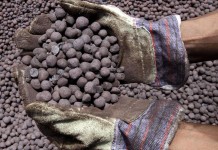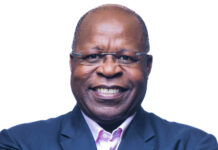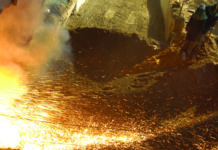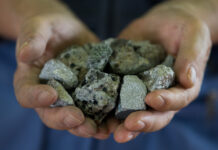
[miningmx.com] — JUNIOR exploration company, Motjoli Resources, is set to challenge South Africa’s top iron ore producer, Kumba Iron Ore (Kumba), which is currently embroiled in a commercial dispute with steel producer Arcelor Mittal SA (Amsa).
Motjoli, co-founded by former stockbroker Nonkqubela Mazwai and former mineral resources department deputy director-general Nchakha Moloi, is planning to spend $1.5bn (R11bn) developing an iron ore mine in Piet Retief, a mining and timber town on the border of Mpumalanga and Mozambique.
The mine, known as Cascades, is expected to produce 20 million tonnes of iron ore from 2012 and will employ up to 400 workers.
Analysts said this week that Motjoli could weaken Kumba’s grip on the metals market in South Africa. However, if it wanted to pull off such a feat, it would have to charge competitive prices to lure customers away from Kumba, the world’s 10th-largest iron ore miner.
Mark Rule, a resources analyst at BoE Private Clients, said: “They can compete with Kumba, but everything will depend on the price and the quality of the iron ore, and whether it is usable by local steel producers.’
Paul Theron, a mining analyst at Vestact Asset Management, said Motjoli was more likely to target overseas customers especially steelmakers in Asia and China than local steel producers such as Highveld Scaw Metals.
“I don’t think they will focus on the local market because prices are lower in South Africa. I think they will export their iron ore to markets such as Asia where they can get better prices for their iron ore,’ said Theron.
In Asia, steel mills pay up to $200 per ton. In contrast, South Africa’s largest steel producer, Amsa, had been getting 6.25 million tonnes of iron ore yearly from Kumba – a subsidiary of Anglo American – at cost plus 3% (or $30 per tonne) for many years until the two got into a pricing brawl in January this year.
This week, the companies struck an interim settlement in which Kumba will supply iron ore to Amsa’s inland plants at $70 per tonne. Amsa’s Saldanha plant will be supplied at $50 per tonen. The agreement expires at the end of July next year.
Motjoli CEO Mazwai said the company was weighing up its options for developing Cascades, which it believes contains up to 1.2 billion tonnes, comparable to Kumba’s Sishen mine reserves in Northern Cape.
“We will either develop the asset with a joint venture partner or go it alone. Or we could develop it with an offtaker (steelmaker),’ Mazwai said.
She said the project had the potential to establish Motjoli as a serious player in the local mining sector because the Cascades mine deposits constituted the biggest iron ore find since the 1920s.
“We are transforming ourselves from being a junior exploration company to a producer. However, we are not going to abandon exploration because it has delivered the most value for us,’ Mazwai said.
Junior exploration firms are high-risk treasure hunters that employ geologists, geophysicists and engineers to find the raw material below the earth’s surface, prove its existence and bring mines into production.
Apart from iron ore, Motjoli boasts a portfolio that includes manganese, coal, diamonds and concrete. The Cascades mine will strengthen the portfolio because it has an expected production life of 60 years.
David Pleming, a mining analyst at Macquarie First South Securities, said the biggest challenge for Motjoli would be South Africa’s subpar railway and ports infrastructure.
He said Transnet had not been able to deliver the infrastructure required by exporters.
“Australia has been growing its iron ore exports by up to 10% a year, but South Africa has done nothing because of Transnet,’ said Pleming.











